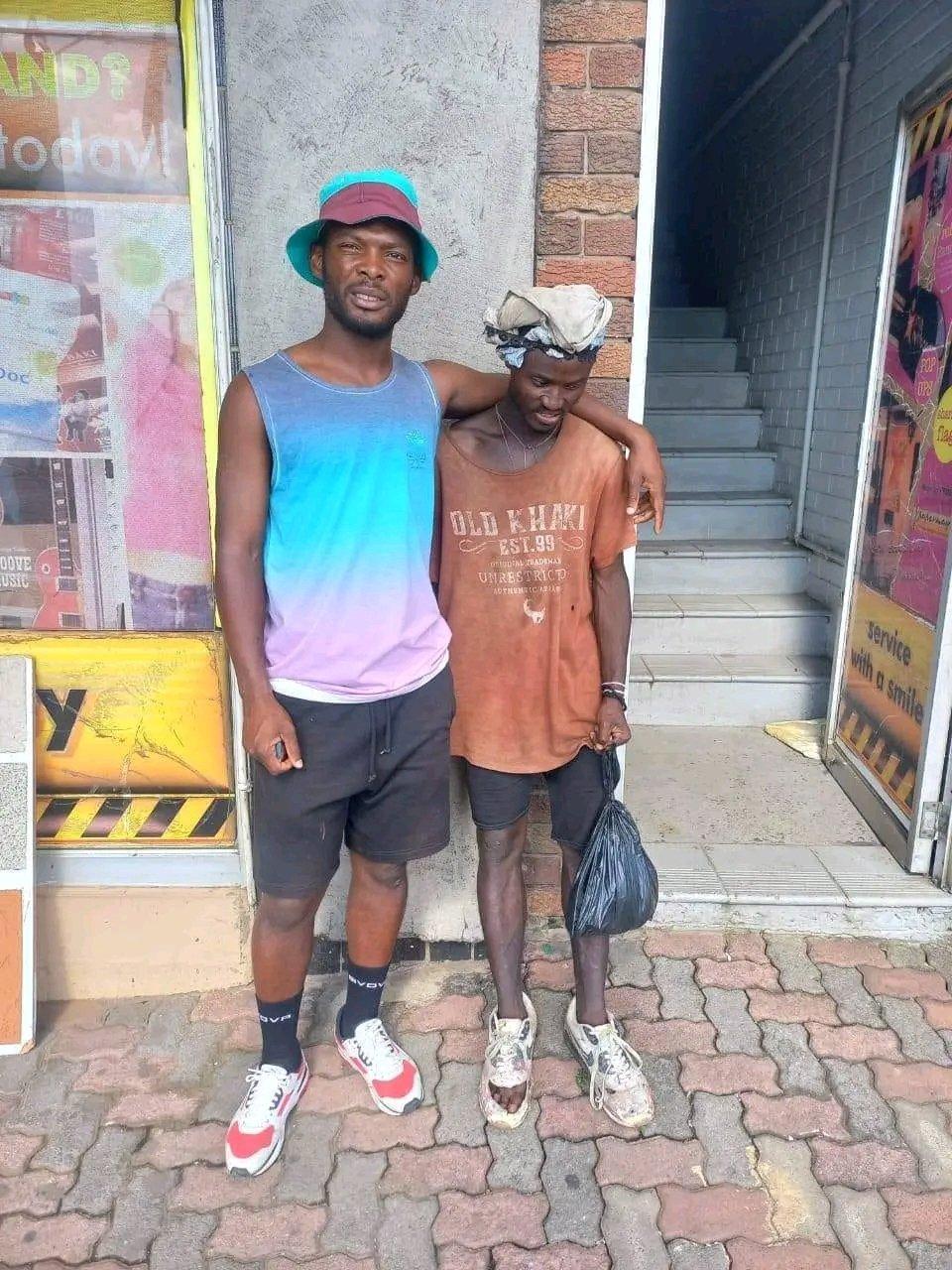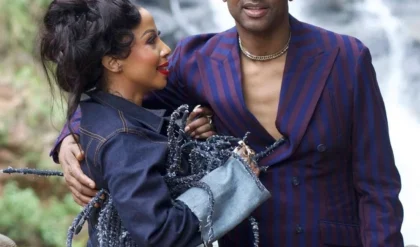The story of Khayelihle Shozi serves as a heartbreaking reminder of how quickly life can unravel. Once a promising football star who graced the fields for South African clubs Mamelodi Sundowns and TS Galaxy, Shozi’s recent appearance as a homeless individual in the streets of the Vaal area has shocked fans and raised questions about the factors that led to his dramatic decline.
A Promising Start
Shozi’s journey in professional football began with high hopes. Known for his skill, agility, and determination, he was a standout talent in the development ranks of Mamelodi Sundowns, one of South Africa’s most prestigious football clubs. Shozi’s performances caught the attention of fans and scouts alike, marking him as a player to watch.
Over time, Shozi moved on to TS Galaxy, where he continued to show flashes of brilliance. His journey in professional football seemed destined for success, a testament to his hard work and dedication. However, as his career progressed, cracks began to appear, both on and off the pitch.
The Start of Troubles
In the highly competitive world of professional football, consistency and focus are key. While Shozi displayed immense talent, rumors of personal struggles and a lack of support began to circulate.
As he transitioned between clubs, his career faced hurdles, including limited game time and financial instability, which may have contributed to his eventual downfall.
In 2022, reports began surfacing about Shozi’s deteriorating mental health. His disappearance during a team camp raised alarms, and his erratic behavior was later attributed to psychological struggles.
His family and friends expressed concerns about his well-being, but despite their efforts, Shozi seemed to drift further from the promising path he once walked.
The Influence of Witchcraft Beliefs
Shozi’s case has also reignited debates around the role of superstition and witchcraft in African society. South Africa, like many other countries on the continent, has a deeply ingrained belief in spiritual forces, both benevolent and malevolent. Some believe Shozi’s downfall may have been influenced by witchcraft, citing his sudden and inexplicable decline.

While there is no concrete evidence to support these claims, the speculation highlights a broader cultural context. In African sports and entertainment circles, tales of spiritual sabotage and jealousy are not uncommon. The notion of witchcraft, whether metaphorical or literal, often serves as an explanation for unexpected misfortune.
Critics argue that attributing Shozi’s struggles to witchcraft oversimplifies the complexities of his situation. Mental health issues, lack of support systems, and the pressures of professional sports are more likely contributing factors.
Life on the Streets
The most heartbreaking chapter of Shozi’s story is his current state. Recent images and reports confirm that Shozi has been seen living on the streets in the Vaal area, visibly homeless and struggling to survive. For fans who once cheered him on from the stands, seeing him in such dire conditions is both shocking and deeply saddening.
Efforts to assist Shozi have been sporadic. While some former teammates, fans, and organizations have expressed a willingness to help, his situation underscores the broader challenges faced by athletes who fall from grace. Many former sports stars in South Africa and beyond struggle with mental health, addiction, and financial woes after their careers end, often with little to no safety net.
The Importance of Mental Health Support in Sports
Shozi’s case shines a spotlight on the need for mental health resources within professional sports. Athletes face immense pressure to perform, often at the cost of their mental and emotional well-being. When careers falter, the lack of adequate support systems can lead to tragic outcomes.

In South Africa, discussions around mental health in sports remain stigmatized. Many players fear seeking help due to perceptions of weakness, further compounding their struggles. Advocates are calling for clubs, leagues, and governing bodies to prioritize mental health initiatives, providing counseling, financial planning, and mentorship programs for players both during and after their careers.
The Role of Community and Responsibility
Shozi’s story also raises questions about collective responsibility. Where were his former teammates, coaches, and fans when his struggles began? Could intervention at an earlier stage have prevented his decline? While personal accountability plays a role, the story highlights the importance of community in supporting individuals facing challenges.
Fans and organizations have taken to social media to discuss ways to help Shozi, with some suggesting fundraisers and others advocating for rehabilitation programs. These efforts, while commendable, often come too late for individuals like Shozi, underscoring the need for proactive measures.
Lessons from Shozi’s Story
Khayelihle Shozi’s tragic fall from football stardom to life on the streets is a sobering tale of potential unfulfilled. It’s a story that underscores the fragility of success and the importance of support systems for athletes navigating the pressures of professional sports.

For young athletes, Shozi’s plight serves as a cautionary tale about the importance of planning for life beyond the pitch. For sports organizations, it’s a reminder of the need to invest in player welfare, not just in terms of physical performance but also in mental and emotional health.
For society at large, Shozi’s story is a call to action to address the stigma around mental health, provide robust support for those in need, and rethink how we care for individuals once the spotlight fades.
A Glimmer of Hope
Despite the challenges, Shozi’s story is not without hope. Efforts are underway to reconnect him with his family and provide him with the help he needs. Former teammates and fans continue to rally behind him, and many believe that with the right support, Shozi can rebuild his life.
As his story unfolds, it serves as a reminder that every individual, no matter how far they’ve fallen, deserves a second chance. Shozi’s journey may yet inspire change in how we approach mental health, community, and care for our heroes, both on and off the field.
News
Kelly Khumalo and Arthur Mafokate ‘wedding’: It was new music all along
When images of Arthur Mafokate and Kelly Khumalo started trending on social media a few weeks ago, rumours about a possible romance and a possible marriage between the two musicians spread like wildfire. It was all purely speculative, as no…
‘Mampintsha was never broke’: Babes Wodumo clears the air on lobola claims
‘I can confirm that, as the Simelanes, we received lobola from Mandla and not from Showmax or PAP,’ Babes Wodumo’s manager said. Babes Wodumo and the late Mampintsha. Images: Instagram @viraltrends Award-winning Gqom queen Babes Wodumo has downplayed allegations made…
29-Year-Old Black Entrepreneur Wants to Buy Spirit Airlines to Make it America’s First Black-Owned Commercial Airline
29-year-old entrepreneur Hashim Walters from New Orleans, Louisiana, has officially launched The Latimer Group, an ownership consortium focused on acquiring Spirit Airlines, an iconic brand facing critical financial distress. He says that his mission is to empower African American economic…
What Gogo Maweni Just Did Is So Heart Breaking
The Escalating Drama Between Scoten and Goa: A Deep Dive into a Social Media War In the world of social media, the line between entertainment and personal conflicts often becomes blurred. This is evident in the ongoing drama between two…
SHOCKING 😯 MPUMELELO MSELEKU SHOT AND KIL#ED SOMEONE…||ALLEGEDLY .
The Latest Update on the Controversy Involving Somizi and Mohale In the world of entertainment, the drama surrounding the relationship between Somizi Mhlongo and Mohale Motaung has become one of the most talked-about topics. This couple has consistently been in…
Strange Things About Somizi And Mohale That No One Talks About
Strange Things About Somizi and Mohale’s Relationship That People Never Talk About In the world of South African celebrity gossip, one relationship that has sparked both admiration and speculation is that of Somizi Mhlongo and Mohale Motaung. The two have…
End of content
No more pages to load











